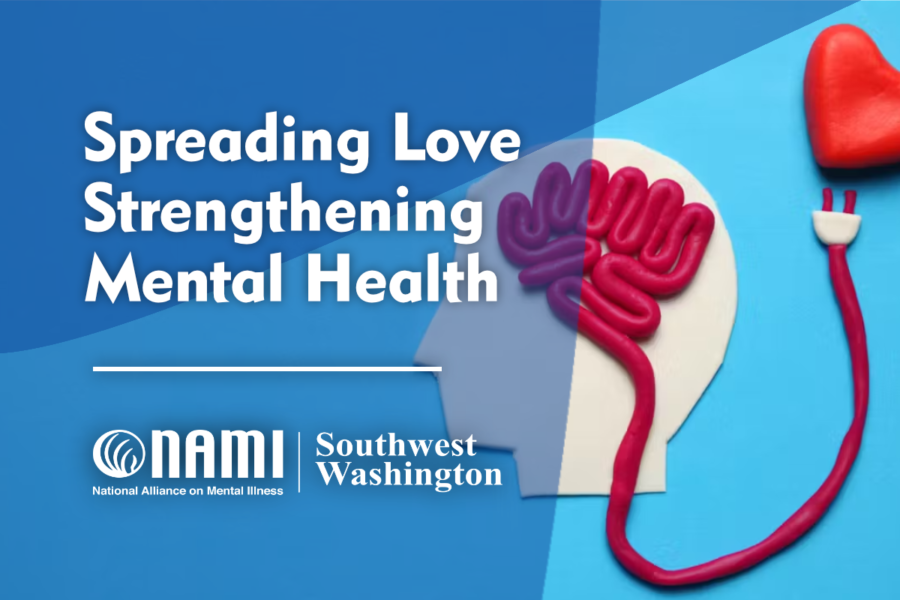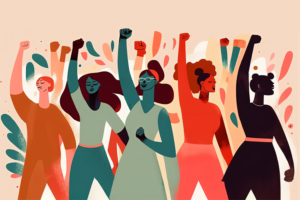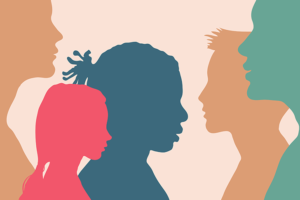By NAMI Southwest Washington
As we move through February, a month that encourages us to pause and reflect on love and connection, two meaningful events converge: Valentine’s Day on February 14 and Random Acts of Kindness Week, celebrated from February 14 to 20. While these may seem like separate occasions, they share a powerful theme—the ability of love and kindness to uplift and transform us.
Valentine’s Day often emphasizes romantic love, but it can be so much more. It’s an invitation to celebrate all forms of love: the love we offer our families, the compassion we extend to friends, and perhaps most importantly, the love we give ourselves. For many, however, Valentine’s Day can be bittersweet or even painful—especially for those struggling with mental health challenges, feelings of isolation, or grief. It’s during these moments that kindness, in all its forms, becomes a lifeline.
This is where Random Acts of Kindness Week provides a powerful counterbalance. It expands the scope of February 14 to a full week dedicated to spontaneous, generous acts of kindness, encouraging us to move beyond traditional ideas of love and focus on simple, everyday gestures of compassion and connection.
Science confirms what many of us intuitively know: kindness heals. When we perform or witness acts of kindness, our brains release a cascade of feel-good hormones like oxytocin, dopamine, and serotonin. These chemicals reduce stress, increase happiness, and create a sense of belonging—all essential for mental well-being. By extending kindness to others, we also help strengthen our own resilience, reminding ourselves that connection and compassion can help carry us through difficult times.
Even small acts of kindness can have a significant impact on our mental health. Holding the door for someone, offering a genuine compliment, or sending a supportive text may seem minor, but these moments can create lasting impressions. For those facing mental health challenges, such gestures may be the highlight of their day—a reminder that they are seen, valued, and not alone.
Valentine’s Day can bring a range of emotions. While some celebrate with joy, others experience heightened feelings of loneliness, sadness, or unfulfilled expectations. For those living with anxiety, depression, or other mental health challenges, these emotions can be difficult to manage.
But what if we reimagined Valentine’s Day? Instead of limiting it to romantic love, we can broaden its meaning to include kindness, compassion, and care—for ourselves and others. This shift allows us to embrace love in its many forms, turning Valentine’s Day into an opportunity for connection and healing.
Here are a few ways to make Valentine’s Day more inclusive and supportive of mental health:
- Check in on a friend you haven’t talked to in a while.
- Write yourself a love letter, recognizing your own strength and resilience.
- Offer your time to volunteer or help someone in need.
- Practice self-care—take a walk in nature, journal your thoughts, or spend a quiet evening recharging.
Self-Kindness: The Foundation of Mental Wellness
Random Acts of Kindness Week reminds us that self-kindness is just as important as kindness toward others. In fact, taking care of ourselves can be one of the most powerful ways to improve our mental health. When we practice self-kindness, we create space for healing and growth.
Some ideas for self-kindness include:
- Forgive yourself for past mistakes.
- Create space for rest and recovery.
- Speak to yourself as you would a close friend, with encouragement and compassion.
- Set boundaries to protect your mental health.
For many, the idea of being kind to oneself can feel unfamiliar, even uncomfortable. But self-kindness is essential—especially when facing the challenges of mental health recovery. When we approach ourselves with compassion, we build a foundation of resilience and self-acceptance that can carry us through difficult times.
Getting Involved in Random Acts of Kindness Week
Participating in Random Acts of Kindness Week doesn’t have to be complicated or time-consuming. It’s about being intentional in our actions, finding small ways to spread kindness in our daily lives.
Here are some simple ways to get started:
- Leave a kind note for a coworker or friend.
- Donate to a local charity or mental health organization.
- Compliment someone sincerely—it might be exactly what they need to hear.
- Listen without judgment to someone who needs to talk.
- Help a neighbor with errands or household tasks.
Creating a Ripple Effect
Acts of kindness can create a ripple effect, inspiring others to pay it forward. For those living with mental health challenges, these small moments of connection and compassion can be life-changing. When we give or receive kindness, we remind ourselves of our shared humanity and the power of community.
Together, Valentine’s Day and Random Acts of Kindness Week offer an opportunity to uplift others while improving our own well-being. Let’s use this week as a chance to build a more connected, compassionate world—one small act at a time.




